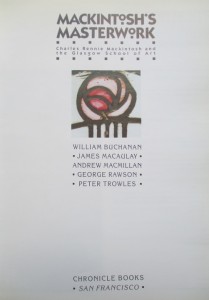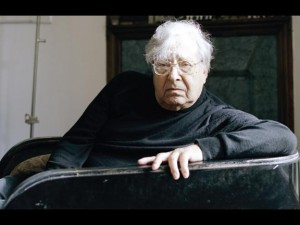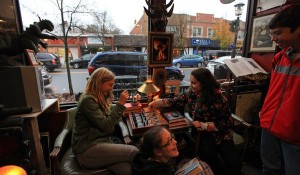Restoration of Charles Rennie Mackintosh’s Glasgow Masterpiece
Glasgow School of Art windows to be restored – Taking great panes | Herald Scotland http://t.co/a6YmbKbNMb … via @hsnewsbreak @MearnsColin
— Herald Picture Desk (@HeraldPictures) June 19, 2013
 On Twitter today I learned that one of the greatest buildings in Europe–the Glasgow School of Art, designed by the brilliant Scottish architect Charles Rennie Mackintosh (1868-1928)–is undergoing a key restoration. The picture desk of the Glasgow Herald shared a story, Taking Great Panes, with photos of the process of restoring the windows in the building which first opened in 1899. Mackintosh was a pioneer of industrial design who placed delicate Art Deco motifs in such solid materials as steel and stone. He was also a notable typographer, furniture and fabric designer, and watercolorist. On the four separate trips I’ve made to Scotland over the years, I’ve visited the school several times and was always gobsmacked by the beauty and utility of the building. It was very impressive to see that Mackintosh’s creation is still in daily use by students and faculty. Consider that people in the building still enter the washrooms under the standard British signs for “Gents” and “Ladies,” which still sport the same lettering that Mackintosh created for them more than a century ago.
On Twitter today I learned that one of the greatest buildings in Europe–the Glasgow School of Art, designed by the brilliant Scottish architect Charles Rennie Mackintosh (1868-1928)–is undergoing a key restoration. The picture desk of the Glasgow Herald shared a story, Taking Great Panes, with photos of the process of restoring the windows in the building which first opened in 1899. Mackintosh was a pioneer of industrial design who placed delicate Art Deco motifs in such solid materials as steel and stone. He was also a notable typographer, furniture and fabric designer, and watercolorist. On the four separate trips I’ve made to Scotland over the years, I’ve visited the school several times and was always gobsmacked by the beauty and utility of the building. It was very impressive to see that Mackintosh’s creation is still in daily use by students and faculty. Consider that people in the building still enter the washrooms under the standard British signs for “Gents” and “Ladies,” which still sport the same lettering that Mackintosh created for them more than a century ago.
The windows are key to the building, as in the library where the glass rises from one story to the next, admitting the most light possible, so vital in Scotland where daylight fails early during many months of the year. It’s also a certainty that Scotland’s rugged climate has taken a toll on the hundreds of window panes that punctuate the stone facade.
I’m happy to say I have a personal connection to this building, and to Glasgow. A late friend, Isi Metzstein, whom I eulogized on this site when he died in January 2012, was a well-known architect and professor of architecture. His business partner and colleague for many years was Andrew Macmillan, one of the co-authors of the book I own on the Glasgow School of Art. It makes me happy to remember Isi when I think about the restoration of this handsome building, and to recall the many happy occasions I spent with him and the whole Metzstein family at their lovely home in Glasgow, which was designed with clear influences from the Mackintosh era. Below are photos I made from pages of the book, Mackintosh’s Masterwork: Charles Rennie Mackintosh and the Glasgow School of Art, and other sources. Please click here to see all pictures.




